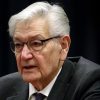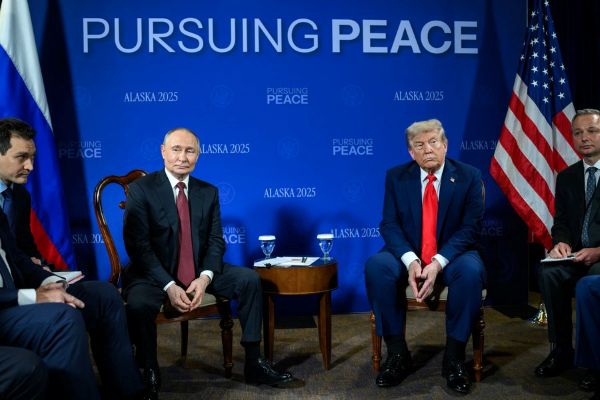A serious phenomenon of our time is the deep aversion that Vladimir Putin and Donald Trump have for Europe.
Trump’s relationship with Putin goes deeper than a simple sympathy between leaders of two superpowers. However, there is a fundamental difference between the two men. The Russian president is noticeably more educated and diplomatically more studied than his American counterpart, who wants to prove internationally that he is a “big dealer” candidate for the Nobel Peace Prize!!!
Neither do they hide their aversion to Europe, which they consider an obstacle to their plans. Vladimir Putin describes European leaders as “puppies wagging their tails at their American master, showing their nakedness in the face of power.” Trump, on the other hand, sees them as susceptible to woke culture.
As Russian philosopher and friend of the Russian president, Aleksandr Dugin, writes, Europe “thinks it can become ‘great’ with talk and ideas. This is a delusion.”
But what follows, from his pen, is very instructive – and even alarming – about the new architecture of the world: “… Putin’s Russia”, he writes, “remains unchanged, remains the same as before. In fact, in a sense, it is becoming a model for the new ‘Great America.’ Now we are moving in the same direction. Only the Americans are doing it quickly, with their characteristic genius, while we are moving gradually and carefully. As a result, I believe that the foreseeable future of the modern world is an alliance between Putin’s Russia and Trump’s America….”
A staunch supporter of traditional beliefs and a theorist of the clash of civilisations between the West and Russia, Dugin hails the “real conservative revolution” taking place in Washington. “Trump and his allies (in the United States) have radically changed the course of the collective West by 180 degrees. Moreover, the West as an entity simply no longer exists,” he says. After years of the Cold War, the warm peace between Americans and Russians, which he so desires, can be fully realised once the Ukrainian issue is resolved.
For Dugin, who largely reflects the thinking of the Kremlin, “Ukraine must belong to us and to no one else. Neither in Europe, nor in America”. And what about Europe in all this? “…..As Putin said, the European elites are just puppies wagging their tails for their American master. Well, let them wag their tails – it’s none of our business. But Ukraine, Belarus, the Baltic states and part of Eastern Europe definitely belong to us on the new map of global redistribution. There is no doubt about that…..”
In this context, Aleksandr Dugin suggests that the Kremlin is supportive of Trump’s potential attempt to annexe Canada and Greenland, and would be willing to contribute to this effort.
Trump and his expansionist goals also provide legitimacy to those who are nostalgic for the Russian Empire: “Canada may become the 51st State of the United States – we have no objection to that. Or Greenland becoming American – we have no objection to that. And even if Western Europe became American, we probably wouldn’t object to that either…,” writes Dugin.
And his writing, to a large extent, reflects the atmosphere prevailing in the Kremlin. An atmosphere that was also confirmed after the gift that Donald Trump gave the Russian president, in the context of their last meeting in Alaska.
“Then next time in Moscow“ – this phrase, on the front page of the Vedomosti newspaper, sums up the atmosphere in Moscow the day after the summit between Vladimir Putin and Donald Trump in Alaska. Without an official agreement or joint statement, the meeting in Anchorage is nevertheless seen as a significant victory for the Kremlin – even a turning point.
The simple fact that the Russian president was received by his American counterpart at a military base in the United States, with a red carpet, an honour guard and applause, is presented by the Russian media as a powerful symbol. Komsomolskaya Pravda, a Russian propaganda newspaper, reports an almost Hollywood-style visit, where Trump invites Putin into his Cadillac, “smiling broadly, as if they were going to a Friday night party.“ This highly symbolic, almost inverted language is no longer the Russian leader seeking to emerge from isolation, but rather the American who seems honoured by the arrival of his geopolitical rival. The message is clear: despite tensions and sanctions, Russia remains a key player, capable of imposing itself at the highest level of international relations.
On Saturday morning, August 16, Russian state television did not hide its satisfaction. Donald Trump, as has been said repeatedly, gave the meeting a 10/10 rating – a highly symbolic figure, used to reinforce Putin’s image as a respected, even admired, negotiator. “A genuine enthusiasm is also expressed on the streets. In the Russian capital, many share a sense of pride, even admiration,“ our Russian colleague Maria Seminova, who is the Moscow correspondent for the French newspaper Le Point, told us.
“Bravo to Putin,“ wrote Dugin, “….He managed not to make a deal and to raise Russia’s prestige high….“
For his part, political scientist Dmitry Orlov, a member of the ruling United Russia party, speaking about the Alaska meeting on his Telegram channel, said that “…it was a great diplomatic success for Russia and personally for its President Vladimir Putin.” According to him, the meeting allowed Trump to understand the “real balance of power” as well as the “real military capabilities” of Russia, far from Western narratives. The logical next step, according to the Russian press: a gradual return to dialogue on sanctions, the territorial issue, nuclear deterrence, and even cooperation in the Arctic. In an international context where Russia seeks to break its diplomatic isolation while pursuing its regional ambitions, this visit to Alaska represents an act of geopolitical communication: reminding everyone – starting with the Europeans and the Chinese – that Russia remains indispensable, even for the United States.
In the short term, the Kremlin is exploiting the image of a respected head of state, who is received with honours despite tensions. In the medium term, Moscow hopes above all that this climate of reopening will weaken Western unity around sanctions and lead to the emergence of “Ukraine fatigue“ in both the United States and Europe.
It is increasingly clear that, as a counterweight to China and the BRICS alliance, Trump is undermining Europe and NATO and preparing an informal alliance with Putin. But bypassing who the Kremlin lord is and how exactly he thinks.

Athanasios Papandropoulos
Athanasios Papandropoulos is a columnist covering business and economic affairs. He is the Honorary International President of the Association of European Journalists (AEJ) and president of the Greek Section.

